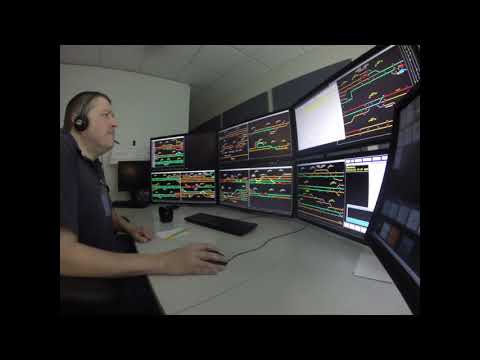Train Dispatcher Job: Responsibilities & Salary
Train Dispatcher Job Description: A train dispatcher is responsible for coordinating and overseeing the movement of trains to ensure safe and efficient operations. They communicate with train crews, track workers, and other personnel to manage train schedules and resolve any issues that may arise. Additionally, train dispatchers monitor signals, track conditions, and weather conditions to make informed decisions regarding train movements. They also maintain detailed records of train activities, including delays and incidents.
Train dispatchers must have strong problem-solving and decision-making skills, as well as excellent communication and coordination abilities. They must be able to remain calm under pressure and make quick and accurate judgments to ensure the safety of train operations. Attention to detail and the ability to multitask are also crucial for this role.
Train Dispatcher Salary: The salary of a train dispatcher can vary depending on factors such as experience, location, and the size of the railway company. On average, train dispatchers in the United States can earn a salary ranging from $45,000 to $75,000 per year. Entry-level train dispatchers may start with a lower salary, while those with several years of experience and advanced skills can earn higher salaries. Some companies may also offer additional benefits such as health insurance, retirement plans, and paid vacation time. Overall, train dispatching can be a financially rewarding career for individuals interested in the transportation industry.

Train Dispatcher Job Description Template
A train dispatcher is responsible for coordinating and managing the movement of trains on a railroad network. Their main role is to ensure the safe and efficient operation of train traffic by making decisions regarding train routes, schedules, and priorities.
Attention to Detail: One of the most important skills for a train dispatcher is attention to detail. They must carefully analyze and interpret information from various sources, including train schedules, track layouts, and communication systems. By paying close attention to these details, they can make accurate decisions and prevent potential accidents or delays.
Problem-Solving: Train dispatchers often face unexpected situations, such as train malfunctions, weather disruptions, or track maintenance issues. In these situations, they must think quickly and come up with effective solutions to keep the train traffic flowing smoothly. They may need to reroute trains, adjust schedules, or coordinate with other departments to resolve problems efficiently.
Other responsibilities of a train dispatcher may include monitoring train movements through computer systems, communicating with train crews and other railroad personnel via radio or telephone, and maintaining accurate records of train activities. They also play a crucial role in ensuring compliance with safety regulations and procedures.
In conclusion, a train dispatcher plays a critical role in the safe and efficient operation of train traffic. Their attention to detail and problem-solving skills are essential for making timely decisions and resolving issues that may arise during train operations.
Train Dispatcher Responsibilities
Train Dispatcher Requirements
How Much Does A Train Dispatcher Make?
Train Dispatcher Salary
| Position | Salary |
|---|---|
| Train Dispatcher | $45,000 |
| Senior Train Dispatcher | $55,000 |
| Lead Train Dispatcher | $65,000 |
A train dispatcher is responsible for coordinating and directing the movement of trains on a rail network. They ensure trains run on time, schedule maintenance, and handle any disruptions or emergencies. With experience and promotions, train dispatchers can advance to senior or lead positions. The salary for a train dispatcher varies based on their level of responsibility and experience. Starting salaries for train dispatchers typically range from $45,000 annually, while senior train dispatchers can earn around $55,000, and lead train dispatchers can make approximately $65,000 per year.
Train Dispatcher Salaries by Country
Top Paying Countries for Train Dispatcher
| Country | Average Salary |
|---|---|
| United States | $65,000 |
| Canada | $60,000 |
| Australia | $55,000 |
| United Kingdom | $50,000 |
| Germany | $45,000 |
Train dispatchers in the United States earn the highest average salary of $65,000 per year. Canada follows closely with an average salary of $60,000. Australia, United Kingdom, and Germany also offer competitive salaries ranging from $55,000 to $45,000. It is important to note that salaries may vary based on factors such as experience, location, and company. Train dispatchers play a crucial role in managing train schedules, ensuring safety, and coordinating operations, making their profession vital in the transportation industry.
A video on the topic Train Dispatcher
Video Source : Key, Lock & Lantern
Interview Questions for Train Dispatcher
1. Can you explain the role of a Train Dispatcher?
A Train Dispatcher is responsible for managing the movement of trains on a railroad system. They coordinate and direct train movements to ensure efficient and safe transportation of goods and passengers.
2. What skills and qualifications are necessary to become a Train Dispatcher?
To become a Train Dispatcher, you need good communication and multitasking skills. A high school diploma or equivalent is usually required, along with on-the-job training. Knowledge of railroad operations and regulations is also important.
3. How do you prioritize train movements during peak hours?
During peak hours, it is crucial to prioritize train movements based on various factors such as passenger demand, delivery schedules, and safety. I would closely analyze the situation, consider train delays, and coordinate with other dispatchers to ensure smooth operations.
4. How do you handle emergency situations or disruptions in train operations?
In emergency situations or disruptions, I would immediately assess the situation, communicate with relevant personnel, and make quick decisions to ensure the safety of passengers and minimize disruptions. This may include rerouting trains, coordinating with maintenance crews, or providing timely updates to passengers.
5. How do you ensure compliance with safety regulations?
As a Train Dispatcher, I would ensure compliance with safety regulations by closely monitoring train movements, communicating with train crews, and following established protocols. Regular training and staying updated on safety regulations are also essential for ensuring compliance.
6. How do you handle conflicting train schedules or limited track availability?
When faced with conflicting train schedules or limited track availability, I would work closely with other dispatchers, train crews, and maintenance personnel to find the best possible solutions. This may involve adjusting train timings, rerouting trains, or temporarily suspending certain services.
7. How do you communicate with train crews and other personnel?
I use various communication methods such as radios, phone systems, and computer systems to communicate with train crews and other personnel. Clear and concise communication is key to ensuring smooth train operations and resolving any issues that may arise.
8. How do you handle stressful situations or high-pressure environments?
In high-pressure environments, I remain calm, prioritize tasks, and focus on finding solutions. I have developed good problem-solving skills and the ability to make quick decisions under pressure. I also believe in maintaining open lines of communication and seeking support from team members when needed.
9. Can you describe a situation where you had to resolve a challenging issue as a Train Dispatcher?
As a Train Dispatcher, I once had to handle a situation where a train had broken down on a busy track during peak hours. I quickly coordinated with maintenance crews to clear the track, rerouted other trains to minimize delays, and provided clear communication to passengers about the situation. By effectively managing the situation, we were able to resume normal operations with minimal disruptions.
10. How do you stay updated on industry trends and technological advancements?
I actively participate in industry conferences, workshops, and online forums to stay updated on industry trends and technological advancements in train dispatching. I also engage in continuous learning and professional development opportunities to enhance my knowledge and skills in this field.






